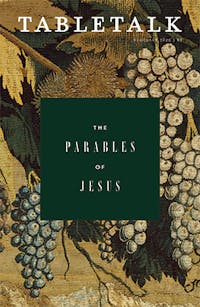
Request your free, three-month trial to Tabletalk magazine. You’ll receive the print issue monthly and gain immediate digital access to decades of archives. This trial is risk-free. No credit card required.
Try Tabletalk NowAlready receive Tabletalk magazine every month?
Verify your email address to gain unlimited access.
Deep-rooted metaphors (God is our rock, love is a journey, and so on) help us grasp truths that otherwise might slip through our mental fingers. John 10 is a prominent example. The complex “word picture” (v. 6; “parable” in some translations) of the shepherd, sheep, the gate to the sheep pen, and would-be thieves gets to the heart of who Jesus is—and how we are called to follow His voice alone. Like any good metaphor, it ripples outward across several contexts. Let us trace them out.
Using details of shepherding familiar to his audience, Jesus envisions a large sheep pen with a gatekeeper guarding the door to ensure that only the real shepherds go in and out with their vulnerable sheep. Anyone who does not go through the gate is a would-be thief. This image evokes how Jesus describes the people as “sheep without a shepherd” (Mark 6:34) and Himself as One sent to gather the lost sheep (Matt. 18:12; Luke 15:3–7). As He lovingly cares for His sheep, it is His “voice” that matters most (John 10:4). In ancient Israel, shepherds would go in front of their sheep and lead them (rather than driving them from behind) purely by voice recognition. At this stage in John’s gospel, Jesus is striving to prove that He is the true leader of “his own” (v. 3), not the corrupt religious authorities who want to destroy them like the would-be thieves in the parable.
But the selection of shepherding/sheep imagery ripples back into Scripture, where the people of God are regularly described as a flock of sheep (1 Kings 22:17; Ps. 44) and Israel’s kings, especially David, as their shepherds (Ps. 78). But when its leaders prove bankrupt, the prophets denounce them as worthless and thieving shepherds (Isa. 56:9–12; Jer. 23:1–4; Zech. 11:4–17). Out of this chaos of sheep-devouring shepherds, God promises to send one true Shepherd, a new David, who will care for the people forever: “I will set up over them one shepherd, my servant David. . . . He shall feed them and be their shepherd” (Ezek. 34:23). By declaring Himself to be the “good shepherd” (John 10:11), Jesus makes clear that He is that promised messianic shepherd. And He will far exceed any earthly shepherd: while “hired hands” run away when trouble comes (v. 12), Jesus will give life to His sheep by laying down His own life (v. 11).
Yet, the image’s ripples go even further. Throughout the Old Testament, God Himself is regularly described as the true shepherd (Gen. 49:24; Pss. 23; 95:7). Moreover, God promises that in the future He Himself “will search for my sheep and will seek them out” (Ezek. 34:11). In other words, both God and the Davidic Messiah are the future shepherds of the flock. It is no real surprise that Jesus teases out the implications: not only does He fill the messianic role of shepherd in His parable, but He declares, “I and the Father are one” (John 10:30). In an amazing yet mysterious way, Jesus, as the Father’s divine Son, fulfills the promise that “one” shepherd—a Trinitarian “one”—would tend to the flock.

Through this beautiful word picture, Jesus reveals that He alone is the door of salvation and the Good Shepherd who, as God enfleshed, tends His flock by dying to deliver it. He knows His own. He loves them. And those who are truly His—given to Him by the Father—know His voice and find security in His flock. Though we “were straying like sheep,” we have “returned to the Shepherd . . . of [our] souls” (1 Peter 2:25). But this glorious truth does not stop there. Jesus, the “great shepherd of the sheep” (Heb. 13:20), has put in place undershepherds to guard and protect His flock now (1 Peter 5:2). These shepherd-pastors ward off thieving false teachers (Acts 20:29). They feed the sheep by caring for their spiritual needs (John 21:16–17). And they labor to help their sheep discern and follow the “voice” of Jesus, which is audible in the Word of God written—the Bible.
How should we respond, then, to John 10? For those who are sheep: let us labor to be good sheep, following the voice of the one Shepherd. For those who are undershepherds: let us lead our flocks through the true “door” to find pasture, and let us tend them not as hired hands who seek selfish gain, but as those who walk in the footsteps of the Good Shepherd.
